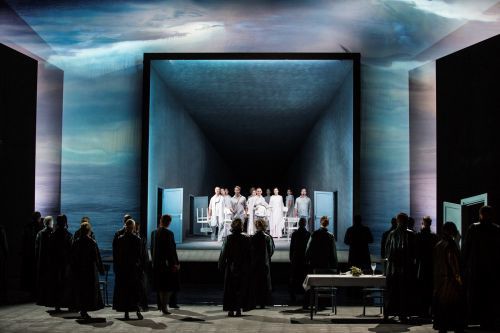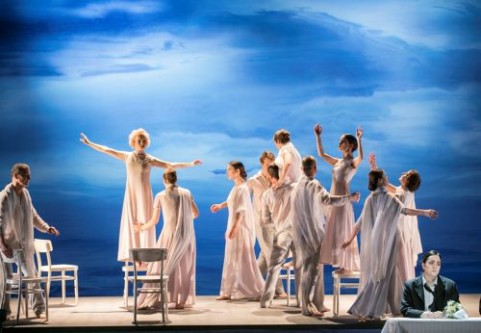 Sweden Cristoph Willibald Gluck: Orfeo ed Euridice (Parma version) Soloists, Gothenburg Opera Orchestra and Chorus, Laurence Cummings (conductor), GöteborgsOperan 08.02.2014 (NS)
Sweden Cristoph Willibald Gluck: Orfeo ed Euridice (Parma version) Soloists, Gothenburg Opera Orchestra and Chorus, Laurence Cummings (conductor), GöteborgsOperan 08.02.2014 (NS)

Cast:
Orfeo: Katarina Karnéus
Euridice: Kerstin Avemo
Amore: Mia Karlsson
Production:
GöteborgsOperan
Direction: David Radok
Set design: Lars-Åke Thessman
Choreography: Håkan Meyer
Costume design: Karin Erskine
Lighting: Torkel Blomkvist
The Gothenburg Opera took the brave decision to perform the little-known Parma version of Gluck’s much-loved opera Orfeo ed Euridice. This version, which Gluck adapted for a Habsburg wedding in Parma in 1769, is shorter than the famous 1774 Paris version (less ballet) and has all three solo roles sung in the soprano register. The result of this gamble is one hour and 15 minutes of musical bliss.
One of the many compelling aspects of this production is its seamlessness: with no interval and David Radok and Lars-Åke Thessman’s efficient staging the music and drama flowed perfectly. Here one understands how Gluck was breaking with the traditions of baroque opera; there were no “numbers” and it would have felt a sacrilege to applaud anywhere before the end of the opera. The audience at the premiere was completely spellbound.
Everyone on stage performed to a superb standard. The chorus were slightly nervous on their first entry but redeemed themselves with a gripping portrayal of the Furies of the Underworld followed by ethereal harmonies as the denizens of Elysium. The dancers mirrored the emotional message of the music very effectively, most of all in Elysium when they delivered Euridice to her husband.
Katarina Karnéus’ Orfeo was a tour de force. Her singing came straight from the heart, whether the numbness of grief at the beginning of the opera or the agony of wanting to embrace Euridice on their journey out of the Underworld while knowing that giving in to desire would kill Euridice a second and final time. Ms Karnéus’ “Che faro senza Euridice” was heartrending. The Gothenburg Opera’s five-year contract with Ms Karnéus appears more of a masterstroke after each production she takes part in.
Kerstin Avemo was an inspired choice as Euridice. Her voice effortlessly sparkled in the occasional vocal pyrotechnics that Gluck allowed himself but was also emotionally expressive and grippingly dramatic, most of all in her one-sided duet (“Vieni, appaga il tuo consorte”) with Orfeo. Her acting was also completely convincing, with Euridice’s increasing desperation never degenerating into excessive histrionics. Both Karnéus and Avemo humanized their characters, which is particularly important for Euridice. In this production the audience can instinctively understand both Orfeo’s and Euridice’s points of view.
Mia Karlsson brought a fresh voice and a puckish streak (one that certainly is found among the gods of Greek mythology) to the role of Amore. At the same time one could see an element of compassion for Orfeo’s grief which makes Gluck’s changed (happy) ending to the Greek myth believable.
Laurence Cummings and the orchestra achieved a perfect balance with the singers together with well-judged tempi that kept the music and drama flowing. It seemed so natural that it defies analysis.

The set and direction were technically flawless but my only minor quibbles are with some aspects of them. In the first scene (Euridice’s funeral) the stage was dominated by flat grey surfaces, the walls of Orfeo’s home (and by extension the numbness of his grief). These receded in a magically choreographed shift to the darkness of the wasteland inhabited by the Furies and the sunlight and blue sky of Elysium. The blessed spirits floated towards the front of the stage on an almost imperceptibly moving raft. Sadly, in the supposedly happy ending Orfeo and Euridice return to the beginning and its slightly oppressive greys.
That said, the slightly odd ending only impaired my appreciation of Gluck’s masterpiece for about ten seconds. I can’t stress enough what a wonderful musical experience it was. Hearteningly I noticed that many parents of young children seemed to have taken the opportunity to introduce them to opera at the premiere. The children seemed as captivated as the rest of us. I hope that this experience will live long in their memories.
Niklas Smith